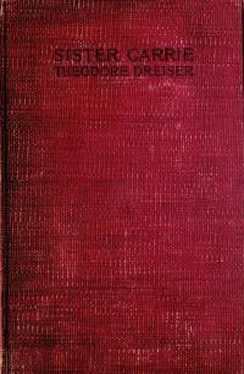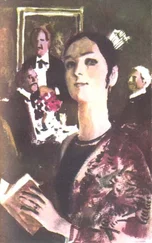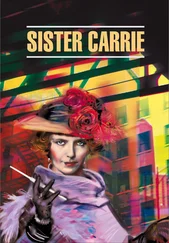Теодор Драйзер - Sister Carrie
Здесь есть возможность читать онлайн «Теодор Драйзер - Sister Carrie» — ознакомительный отрывок электронной книги совершенно бесплатно, а после прочтения отрывка купить полную версию. В некоторых случаях можно слушать аудио, скачать через торрент в формате fb2 и присутствует краткое содержание. Год выпуска: 2004, Жанр: Классическая проза, на английском языке. Описание произведения, (предисловие) а так же отзывы посетителей доступны на портале библиотеки ЛибКат.
- Название:Sister Carrie
- Автор:
- Жанр:
- Год:2004
- ISBN:нет данных
- Рейтинг книги:4 / 5. Голосов: 1
-
Избранное:Добавить в избранное
- Отзывы:
-
Ваша оценка:
- 80
- 1
- 2
- 3
- 4
- 5
Sister Carrie: краткое содержание, описание и аннотация
Предлагаем к чтению аннотацию, описание, краткое содержание или предисловие (зависит от того, что написал сам автор книги «Sister Carrie»). Если вы не нашли необходимую информацию о книге — напишите в комментариях, мы постараемся отыскать её.
Sister Carrie — читать онлайн ознакомительный отрывок
Ниже представлен текст книги, разбитый по страницам. Система сохранения места последней прочитанной страницы, позволяет с удобством читать онлайн бесплатно книгу «Sister Carrie», без необходимости каждый раз заново искать на чём Вы остановились. Поставьте закладку, и сможете в любой момент перейти на страницу, на которой закончили чтение.
Интервал:
Закладка:
"Do you remember how nervous you were that night at the Avery?" he asked.
Carrie smiled to think of it.
"I never saw anybody do better than you did then, Cad," he added ruefully, as he leaned an elbow on the table; "I thought you and I were going to get along fine those days."
"You mustn't talk that way," said Carrie, bringing in the least touch of coldness.
"Won't you let me tell you——"
"No," she answered, rising. "Besides, it's time I was getting ready for the theatre. I'll have to leave you. Come, now."
"Oh, stay a minute," pleaded Drouet. "You've got plenty of time."
"No," said Carrie, gently.
Reluctantly Drouet gave up the bright table and followed. He saw her to the elevator and, standing there, said:
"When do I see you again?"
"Oh, some time, possibly," said Carrie. "I'll be here all summer. Good-night!"
The elevator door was open.
"Good-night!" said Drouet, as she rustled in.
Then he strolled sadly down the hall, all his old longing revived, because she was now so far off. The merry frou-frou of the place spoke all of her. He thought himself hardly dealt with. Carrie, however, had other thoughts.
That night it was that she passed Hurstwood, waiting at the Casino, without observing him.
The next night, walking to the theatre, she encountered him face to face. He was waiting, more gaunt than ever, determined to see her, if he had to send in word. At first she did not recognise the shabby, baggy figure. He frightened her, edging so close, a seemingly hungry stranger.
"Carrie," he half whispered, "can I have a few words with you?"
She turned and recognised him on the instant. If there ever had lurked any feeling in her heart against him, it deserted her now. Still, she remembered what Drouet said about his having stolen the money.
"Why, George," she said; "what's the matter with you?"
"I've been sick," he answered. "I've just got out of the hospital. For God's sake, let me have a little money, will you?"
"Of course," said Carrie, her lip trembling in a strong effort to maintain her composure. "But what's the matter with you, anyhow?"
She was opening her purse, and now pulled out all the bills in it—a five and two twos.
"I've been sick, I told you," he said, peevishly, almost resenting her excessive pity. It came hard to him to receive it from such a source.
"Here," she said. "It's all I have with me."
"All right," he answered, softly. "I'll give it back to you some day."
Carrie looked at him, while pedestrians stared at her. She felt the strain of publicity. So did Hurstwood.
"Why don't you tell me what's the matter with you?" she asked, hardly knowing what to do. "Where are you living?"
"Oh, I've got a room down in the Bowery," he answered. "There's no use trying to tell you here. I'm all right now."
He seemed in a way to resent her kindly inquiries—so much better had fate dealt with her.
"Better go on in," he said. "I'm much obliged, but I won't bother you any more."
She tried to answer, but he turned away and shuffled off toward the east.
For days this apparition was a drag on her soul before it began to wear partially away. Drouet called again, but now he was not even seen by her. His attentions seemed out of place.
"I'm out," was her reply to the boy.
So peculiar, indeed, was her lonely, self-withdrawing temper, that she was becoming an interesting figure in the public eye—she was so quiet and reserved.
Not long after the management decided to transfer the show to London. A second summer season did not seem to promise well here.
"How would you like to try subduing London?" asked her manager, one afternoon.
"It might be just the other way," said Carrie.
"I think we'll go in June," he answered.
In the hurry of departure, Hurstwood was forgotten. Both he and Drouet were left to discover that she was gone. The latter called once, and exclaimed at the news. Then he stood in the lobby, chewing the ends of his moustache. At last he reached a conclusion—the old days had gone for good.
"She isn't so much," he said; but in his heart of hearts he did not believe this.
Hurstwood shifted by curious means through a long summer and fall. A small job as janitor of a dance hall helped him for a month. Begging, sometimes going hungry, sometimes sleeping in the park, carried him over more days. Resorting to those peculiar charities, several of which, in the press of hungry search, he accidentally stumbled upon, did the rest. Toward the dead of winter, Carrie came back, appearing on Broadway in a new play; but he was not aware of it. For weeks he wandered about the city, begging, while the fire sign, announcing her engagement, blazed nightly upon the crowded street of amusements. Drouet saw it, but did not venture in.
About this time Ames returned to New York. He had made a little success in the West, and now opened a laboratory in Wooster Street. Of course, he encountered Carrie through Mrs. Vance; but there was nothing responsive between them. He thought she was still united to Hurstwood, until otherwise informed. Not knowing the facts then, he did not profess to understand, and refrained from comment.
With Mrs. Vance, he saw the new play, and expressed himself accordingly.
"She ought not to be in comedy," he said. "I think she could do better than that."
One afternoon they met at the Vances' accidentally, and began a very friendly conversation. She could hardly tell why the one-time keen interest in him was no longer with her. Unquestionably, it was because at that time he had represented something which she did not have; but this she did not understand. Success had given her the momentary feeling that she was now blessed with much of which he would approve. As a matter of fact, her little newspaper fame was nothing at all to him. He thought she could have done better, by far.
"You didn't go into comedy-drama, after all?" he said, remembering her interest in that form of art.
"No," she answered; "I haven't, so far."
He looked at her in such a peculiar way that she realised she had failed. It moved her to add: "I want to, though."
"I should think you would," he said. "You have the sort of disposition that would do well in comedy-drama."
It surprised her that he should speak of disposition. Was she, then, so clearly in his mind?
"Why?" she asked.
"Well," he said, "I should judge you were rather sympathetic in your nature."
Carrie smiled and coloured slightly. He was so innocently frank with her that she drew nearer in friendship. The old call of the ideal was sounding.
"I don't know," she answered, pleased, nevertheless, beyond all concealment.
"I saw your play," he remarked. "It's very good."
"I'm glad you liked it."
"Very good, indeed," he said, "for a comedy."
This is all that was said at the time, owing to an interruption, but later they met again. He was sitting in a corner after dinner, staring at the floor, when Carrie came up with another of the guests. Hard work had given his face the look of one who is weary. It was not for Carrie to know the thing in it which appealed to her.
"All alone?" she said.
"I was listening to the music."
"I'll be back in a moment," said her companion, who saw nothing in the inventor.
Now he looked up in her face, for she was standing a moment, while he sat.
"Isn't that a pathetic strain?" he inquired, listening.
"Oh, very," she returned, also catching it, now that her attention was called.
"Sit down," he added, offering her the chair beside him.
They listened a few moments in silence, touched by the same feeling, only hers reached her through the heart. Music still charmed her as in the old days.
"I don't know what it is about music," she started to say, moved by the inexplicable longings which surged within her; "but it always makes me feel as if I wanted something—I——"
Читать дальшеИнтервал:
Закладка:
Похожие книги на «Sister Carrie»
Представляем Вашему вниманию похожие книги на «Sister Carrie» списком для выбора. Мы отобрали схожую по названию и смыслу литературу в надежде предоставить читателям больше вариантов отыскать новые, интересные, ещё непрочитанные произведения.
Обсуждение, отзывы о книге «Sister Carrie» и просто собственные мнения читателей. Оставьте ваши комментарии, напишите, что Вы думаете о произведении, его смысле или главных героях. Укажите что конкретно понравилось, а что нет, и почему Вы так считаете.









